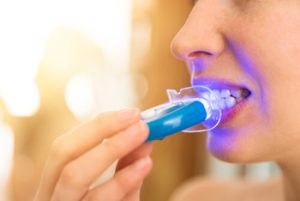In our pursuit of a radiant smile, teeth whitening has become a go-to solution for millions worldwide. But how long does teeth whitening last? It’s a question many of us ponder before diving into any whitening treatment. While the promise of pearly whites is tantalising, understanding the longevity of these results can help manage expectations and maintain that dazzling smile. So, let’s delve into teeth whitening, explore various treatments, and uncover the secrets to prolonging those sparkling results. Comparing at-home options to professional teeth whitening treatment, it’s clear that professional treatments from dental clinics provide stronger and longer-lasting results due to the effectiveness of the agents used by dentists.
Understanding the Basics: What is Meant by Teeth Whitening?
Teeth whitening is a cosmetic dental procedure that lightens teeth’s colour and removes stains and discolouration. But it’s not a one-size-fits-all approach. There are myriad teeth whitening methods available, ranging from in-chair professional treatments to at-home whitening kits, each with varying levels of effectiveness and duration.
Teeth whitening generally involves using bleaching agents like hydrogen peroxide or carbamide peroxide, which permeate the tooth enamel to dissolve stains. A common method involves using a teeth whitening gel, a clear gel containing peroxide, available in both professional treatments and over-the-counter products. These stains are generally caused by various factors, including staining foods like coffee and red wine, certain medications, smoking, and even the natural ageing process.
The Big Question: How Long Does Teeth Whitening Last?
The success and duration of your teeth whitening results can be affected by numerous factors, such as the whitening method preferred, your daily habits, and your commitment to oral hygiene. Generally, professional teeth whitening results can last from six months to two years, though this timeframe can differ greatly from one individual to another.
Professional Teeth Whitening: The Gold Standard

One of the main merits of professional teeth whitening is the use of potent bleaching agents, which are much stronger than those found in over-the-counter whitening products. These agents penetrate deeper into the tooth enamel, breaking down even the most stubborn stains. Additionally, The skill and knowledge of a dental professional guarantee that the treatment is safe, effective, and customised to meet your unique needs.
Not All Whitening Treatments Are Created Equal: Comparing Methods
While professional teeth whitening treatment is undoubtedly effective and offers longer-lasting results, it’s essential to consider other teeth whitening methods if you’re looking for a more budget-friendly or convenient option.
At-Home Teeth Whitening: Convenience at a Cost
At-home teeth whitening kits, including whitening strips, whitening pens, and over-the-counter teeth whitening gel, provide a more budget-friendly and convenient option compared to professional treatments. When used with trays, these gels contain peroxide to effectively remove stains and discolouration, but the results may be less striking and may not last as long as those achieved with professional treatments.
The effects of at-home whitening can last anywhere from a few months to a year, depending on the product used and how consistently you apply it. However, it’s worth noting that at-home treatments may require more frequent touch-ups to preserve the desired level of whiteness.
Whitening Toothpastes and Toothpastes: The Everyday Solution
Whitening toothpastes are perhaps the most accessible teeth-whitening products available. These products contain mild abrasives and small amounts of bleaching agents that assist in removing surface stains and help prevent new ones from developing. However, they don’t penetrate the tooth enamel like other whitening treatments, so the whitening effect is generally more subtle.
The results from whitening toothpaste are temporary, usually lasting only as long as you continue to use the product. While they are an excellent option for maintaining the results of professional or at-home whitening treatments, they won’t deliver significant whitening on their own.
The Role of Lifestyle and Oral Hygiene: Keeping Your Smile Bright
Regardless of the teeth whitening method you select, maintaining your results requires a commitment to good oral hygiene habits and mindful lifestyle choices.
The Impact of Staining Foods and Drinks
Some foods and drinks are well-known for their ability to stain teeth. Common culprits are coffee, tea, red wine, and certain fruit juices. To keep your teeth white for longer, it’s recommended to limit your consumption of these beverages or use a straw to minimise contact with your teeth. Additionally, rinsing your mouth with water after eating staining foods can help minimise the risk of discolouration.
Smoking: A Major No-No for White Teeth
Smoking is one of the leading causes of tooth discolouration. The nicotine and tar in tobacco products can cause yellow or brown stains that are hard to remove. If you’re serious about maintaining your white smile, quitting smoking is one of the most effective actions you can take.
Practising Good Oral Hygiene
Good oral hygiene is paramount to keeping the results of your whitening treatment. Brushing your teeth at least twice, flossing daily, and using an antibacterial mouthwash can prevent plaque build-up and remove surface stains. Regular visits to your dental clinic for professional cleanings can also help keep your teeth looking their best.
The Science Behind Whitening: What Makes Teeth Whitening Work?
To fully appreciate how long teeth whitening lasts, it’s essential to understand the science behind the process. Teeth whitening utilises bleaching agents like hydrogen peroxide or carbamide peroxide, which fragment into oxygen molecules that penetrate the tooth enamel, lightening the colour of the teeth.
Hydrogen Peroxide vs. Carbamide Peroxide: How Do They Differ?
Hydrogen peroxide is the active component in most professional teeth whitening treatments. It’s a potent bleaching agent that quickly removes deep stains and brightens teeth. On the other hand, Carbamide peroxide is a compound that decomposes into hydrogen peroxide and urea when applied to the teeth. It’s commonly used in at-home whitening products and is slower-acting, which makes it a bit gentler on the teeth.
Both hydrogen peroxide and carbamide peroxide serve as effective whitening agents, but the choice between them often depends on the concentration of the product and the desired speed of results.
The Bleaching Process: How It All Happens
The bleaching process begins when the whitening gel, containing either hydrogen peroxide or carbamide peroxide, is applied to the teeth. The peroxide molecules break down, releasing oxygen that penetrates the enamel and dentin layers of the tooth. This oxygen reacts with the discoloured molecules, breaking the bonds that hold them together and effectively “bleaching” the teeth.
The process doesn’t change the tooth’s structure but alters the colour, making teeth appear whiter. The effectiveness of the bleaching process depends on the concentration of the bleaching agent, the time duration of treatment, and the individual’s tooth structure.
Enhancing and Prolonging Whitening Results: Tips and Tricks
To make the most of your whitening treatment and keep your teeth looking bright for as long as possible, consider the following tips:
Opt for Touch-Up Treatments

Use a Whitening Toothpaste
As mentioned earlier, whitening toothpastes are great for maintaining the results of your whitening treatment. Look for products containing fluoride to strengthen tooth enamel and prevent decay while keeping your teeth white.
Avoid Staining Habits
Cutting back on or avoiding habits that cause staining, such as smoking and drinking dark-coloured beverages, will help prolong the life of your whitening treatment. Consider switching to lighter-coloured drinks, using a straw, or rinsing your mouth with water after meals to reduce the risk of stains.
Maintain Regular Dental Check-Ups
Regular check-ups with your dentist are indispensable for maintaining not only your overall oral health but also the longevity of your whitening results. Professional cleanings can eliminate surface stains and plaque that at-home care might miss, ensuring your smile stays bright and healthy.
FAQs About Teeth Whitening
Q: Is teeth whitening safe for everyone?
A: Teeth whitening is typically safe for the majority of people when performed correctly, especially under the guidance of a dental professional. However, it may not be suitable for those with certain dental issues, such as gum disease, tooth decay, or sensitive teeth. It’s always advised to consult with a dental professional before beginning any whitening treatment.
Q: How soon will I see results from teeth whitening?
A: The timeframe for seeing results varies depending on the whitening method used. Professional teeth whitening treatments can deliver visible results in just a single session, often within an hour. At-home whitening kits may take several days to weeks to show significant changes while whitening toothpaste provides gradual results over time.
Q: Can teeth whitening cause sensitivity?
A: Yes, teeth whitening can cause temporary tooth sensitivity for some people. This occurs because the bleaching agents used in the process can temporarily weaken the enamel, making the teeth more sensitive to hot, cold, or sweet stimuli. The sensitivity usually subsides within a few days after the treatment. If you experience significant discomfort, it’s advisable to consult your dentist.
Q: How frequently can I whiten my teeth?
A: The frequency of teeth whitening varies according to the method you choose and your specific needs. Professional teeth whitening treatments are usually recommended once every 6 to 12 months. At-home treatments, like whitening strips or gels, can be used more frequently but should be done in moderation to avoid damaging the enamel. Always follow the guidelines provided by your dental professional or the product manufacturer.
Q: Can I whiten my teeth while having dental restorations, like crowns or veneers?
A: Teeth whitening treatments typically do not work on dental restorations like crowns, veneers, or fillings. These materials do not react to bleaching agents, so they will remain the same colour while your natural teeth whiten. This can result in uneven colouring. If you have restorations, discuss whitening options with your dentist to ensure a uniform appearance is best.
Q: What should I avoid after whitening my teeth?
A: After whitening your teeth, it’s recommended to steer clear of foods and drinks that stain your teeth, such as coffee, tea, and red wine, and dark-coloured berries. Additionally, avoid smoking and using tobacco products. Practising good oral hygiene and using a straw when drinking staining beverages can help maintain your whitening results.
Q: Are over-the-counter teeth whitening products effective?
A: Over-the-counter teeth whitening products, such as whitening strips, teeth whitening gel, and toothpaste, can be effective to a certain extent. Teeth whitening gel, in particular, contains peroxide that helps remove stains and discolouration. However, these products generally contain lower concentrations of bleaching agents than professional treatments, so the results may be less dramatic and shorter-lasting. These products are best used as maintenance after a professional whitening treatment.
Q: Can teeth whitening damage my enamel?
A: When used correctly, teeth whitening treatments should not damage the enamel. However, overuse or incorrect application, particularly with high-concentration bleaching agents, can weaken the enamel and increase the risk of tooth sensitivity and decay. It’s important to adhere to the recommended guidelines and consult with an experienced dental professional for safe and effective whitening.
Q: How do I maintain my whitening results?
A: To maintain your whitening results, practise good oral hygiene, including brushing twice daily with fluoride toothpaste, flossing regularly, and visiting your dentist for routine cleanings. Avoid staining foods and drinks, or use a straw to minimise contact with your teeth. Touch-up treatments, professionally or at home, can also help brighten your smile.
Q: Can teeth whitening deal with all types of stains?
A: Teeth whitening effectively removes many types of surface stains, such as those resulting from food, drink, and smoking. However, it may not be as effective on intrinsic stains, which are deeper ones caused by certain medications, trauma, or excessive fluoride exposure. Alternative cosmetic treatments like veneers or bonding may be recommended for these types of stains.
The Final Word: Is Teeth Whitening Right for You?
Teeth whitening is a highly effective cosmetic dentistry option for enhancing their smile. However, the longevity of the results depends on multiple factors, including the type of whitening treatment you choose, your lifestyle habits, and how well you maintain your oral hygiene.
If you’re considering teeth whitening, consult with a dental professional to discuss the suitable options for your needs. Whether you opt for professional teeth whitening in a dental clinic or an at-home teeth whitening method, diligent care and mindful habits are key to lasting results.
So, how long does teeth whitening last? With the right approach, you can enjoy a brighter, whiter smile for years.
For more information or to schedule an appointment, feel free to contact us at Finesse Dental by calling (02) 8806 0790. We’re here to help you achieve your desired smile!
References:
WebMD. (n.d.). Teeth whitening and bleaching. Retrieved from https://www.webmd.com/oral-health/teeth-whitening-and-bleaching
MedlinePlus. (n.d.). Teeth whitening. Retrieved from https://medlineplus.gov/ency/imagepages/1121.htm
Colgate. (n.d.). How to get rid of teeth sensitivity after whitening. Retrieved from https://www.colgate.com/en-in/oral-health/teeth-whitening/how-to-get-rid-of-teeth-sensitivity-after-whitening
Healthline. (n.d.). Foods that stain teeth. Retrieved from https://www.healthline.com/health/foods-that-stain-teeth
Cleveland Clinic. (n.d.). Oral hygiene. Retrieved from https://my.clevelandclinic.org/health/treatments/16914-oral-hygiene

